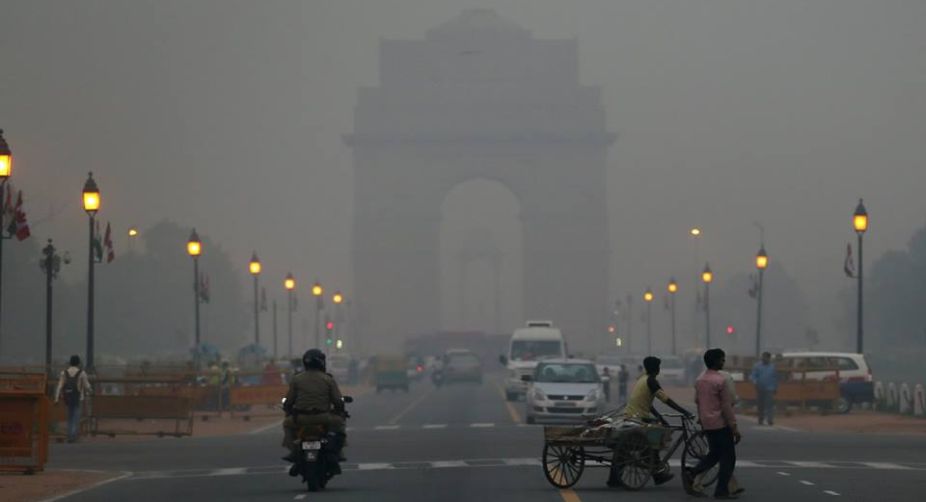A Supreme Court-appointed panel on Tuesday asked the Delhi Metro to drop fares and increase frequency for the next two days, while ordering a fourfold hike in vehicle parking fee in a bid to curb worsening air quality in Delhi as the high-pollution winter months kick in.
As a thick pollution blanket enveloped Delhi-NCR on Tuesday with the worst air quality so far, the Environment Pollution Prevention and Control Authority (EPCA) barred entry of trucks with goods not meant for Delhi, asked Traffic Police to increase personnel on ground and impose a penalty of Rs 50,000 on construction companies found not taking enough measures to control dust.
Advertisement
Directing the government to take all measures under the “severe” category of the Graded Response Action Plan, EPCA Chairman Bhure Lal ordered immediate intensification of the public transport system, closure of all brick kilns, stone crushers and hot-mix plants, and to imposing fines on all road constructing agencies who have inadequate dust control measures.
He however said the emergency plan “cannot become a substitute for long term and decisive action to cut air pollution”.
The EPCA also advised all the schools to stop all outdoor activities, as the Environment Ministry’s health advisory said that the present pollution situation “may cause respiratory effects even on healthy people”.
Meanwhile, the Delhi government on Tuesday announced closure of primary schools on Wednesday and also prohibited outdoor activities for older students.
The EPCA, in its meeting, also ordered the Delhi government to prepare for odd-even plan again.
In a bid to discourage use of private vehicles, it asked Delhi Metro to immediately increase frequency of service, add more coaches and introduce lower fares during off peak hours during this period. It also ordered an immediately four-fold hike in parking fee.
A Delhi Metro official meanwhile told IANS that they have received the order “but we are yet to arrive at a decision” on decreasing the fares.
The EPCA also ordered to intensified traffic management at all hotspots and increased deployment of traffic police to avoid congestion. It also sought intensified enforcement of goods traffic only transiting through Delhi by physically checking all vehicles and turning them back, while also putting out public announcements of the numbers that are turned back.
Observing that “not a single brick kiln across Delhi-NCR was verified till date”, which meant none of them adhered to its recommendation to install the less-polluting zig-zag chimney, the EPCA ordered their immediate closure.
“We have achieved some things — often in the face of enormous odds — and we have provided some solutions. So far, every solution that has been suggested has been contested and delayed,” Lal said.
Calling for “strict enforcement” and “long term steps” to ensure clean air in Delhi-NCR, which the environment authority said was “entirely in the government’s hand” and must be worked upon “starting today”, the EPCA also pointed out that not even a single bus was procured in last three years in Delhi.
It added that a massive switch-over to gas is needed in vehicles, power plants and industry.
“We must priorities transition to electric vehicles, and ensure supply of reliable power to stop the use of gen-sets,” the environment body said.
The National Capital Region saw its worst air quality and smog situation of the year – which was even worse than a day after Diwali – as a yellow blanket of smog hung heavily in the sky.
The pollution level on Tuesday rose to dangerous levels, with at least 20 out of 23 active pollution monitoring stations across Delhi-NCR recording “severe” air quality, which was even worse than the day after Diwali.
The Air Quality Index (AQI), according to the Central Pollution Control Board at 4 p.m. reached an alarming 448 or “severe”, as against a level of 445 on the day after Diwali last year when the city saw its worst pollution in a decade. The average PM2.5 (particles with diameter less than 2.5 mm) was 439 – as against the Indian safe limit of 60 and global standard of 25.
CPCB Member Secretary A. Sudhakar said: “Currently, Delhi and its neighbouring region are seeing almost still conditions at the ground level, but in the upper atmosphere, there are two wind masses – one from Punjab, which is bringing pollutants from crop burning and the other from eastern UP, which is bringing moisture.
These are colliding at the higher altitude, and leading to a condition where there is both moisture and pollution as well as no wind at the ground level, he said, adding they expect the “conditions to remain severe over the next two days as per the forecast made available by India Meteorological Department (IMD)”.











